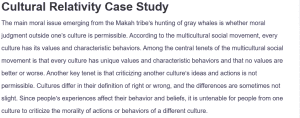Cultural Relativity Case Study
The main moral issue emerging from the Makah tribe’s hunting of gray whales is whether moral judgment outside one’s culture is permissible. According to the multicultural social movement, every culture has its values and characteristic behaviors. Among the central tenets of the multicultural social movement is that every culture has unique values and characteristic behaviors and that no values are better or worse. Another key tenet is that criticizing another culture’s ideas and actions is not permissible. Cultures differ in their definition of right or wrong, and the differences are sometimes not slight. Since people’s experiences affect their behavior and beliefs, it is untenable for people from one culture to criticize the morality of actions or behaviors of a different culture.
UTILITY PERSPECTIVE
The actions of the Makah tribe can be justified or refuted from a utility perspective. Utility, or the ‘greatest happiness’ principle, can be used to evaluate the morality of culture-specific behavior or actions (Ruggiero 152). A cultural action, custom, or behavior may be accepted based on the immediate and long-term consequences it poses. As per the case, most gray whale hunting proponents argue that the practice provides many benefits and opportunities for the Makah tribe. One such benefit identified in the case is that it bolsters a sense of discipline among the young men of the Makah tribe (Ruggiero 60). Additionally, the practice improves people’s nutritional well-being since it is a source of food historically in the tribe. Also, the practice enhances a sense of pride in young men, building strong and productive society members in the long run (Ruggiero 60). Since there is no mention of how gray whale hunting may directly and negatively affect people, the benefits of the practice outweigh the downsides. Maintaining the practice will cause the greatest happiness compared to abandoning it; hence, the Malkah tribe should be permitted to continue gray whale hunting.
RIGHTS PERSPECTIVE
According to Chonko, a rights framework can also be used to determine whether it is right to judge or ban the gray whale hunting practice by the Makah tribe (2). Rights are considered moral or ethically correct as long as a large population of the relevant community supports them. It is incumbent upon society to decide the rights it wants to prioritize for its people, who are expected to respect them. Given that the Makah tribe is indigenous, it deserves the right to continue practicing traditions held high in the community for thousands of years (Ruggiero 60). On the contrary, the whales are also entitled to the right to life. Given the competing nature of the rights, the concerned community should prioritize which rights to uphold. The Makah tribe has practiced the hunting exercise for thousands of years, implying that they prioritize their right to hunt over preserving the animals’ right to life. Based on this, the people of the Makah tribe should be permitted to continue the practice as long as they agree that it is permissible.
CONCLUSION
In summary, every culture has a value system that determines its constituents’ actions and behaviors. Notably, the beliefs and values of one culture are not worse or better than another. The practices of the Makah tribe shown above are specific to the tribe and are guided by the underlying beliefs and values of the Makah people. Therefore, no one should criticize the morality of whale hunting among the people of the Makah tribe.
Works Cited
Chonko, Larry. “Ethical Theories.” The University of Texas at Arlington, 2012.
Ruggiero, Vincent Ryan. Thinking Critically about Ethical Issues. New York, McGraw-Hill Education, 2015.
ORDER A PLAGIARISM-FREE PAPER HERE
We’ll write everything from scratch
Question
For this module, you are required to complete a Written Case Analysis which will be assessed for depth and breadth. Please read Thinking Critically About Ethical Issues, Case 1, pp. 61-62. Identify the moral issue(s) and the parties involved. Discuss the moral issues you have identified in terms of two of the following: utility, duties, rights.
Your analysis should be approximately 500 words in length and all sources should be cited properly in MLA format.

Cultural Relativity Case Study
Case 1
- The Makah tribe claim to have hunted gray whales for more than 2,000 years. They stopped in the 1920s due to a decline in the number of gray whales. Now they want to return to the hunt to provide food for their tribe and to restore the young men’s sense of discipline and pride in their traditions. Pro-ponents of the hunt claim that a majority of the tribe support the hunt, which is expected to take fewer than the five whales they are permitted by law to kill. Tribal leaders claim they will take no pregnant or nursing females. Some Makah elders disagree, however, pointing out that the tribe survived for most of the twentieth century without eating whale meat and claiming that there are better ways to instill pride and discipline. The environmental community argues that the whale hunt is immoral because it violates the whales’ right to exist on the planet. Is it appropriate for nonmembers of the Makah tribe—for example, students in your class—to evaluate the morality of the Makah whale hunt? Explain.
Textbook:
- Ruggiero, Vincent. Thinking Critically About Ethical Issues. McGraw-Hill Higher Education. Kindle Edition.

